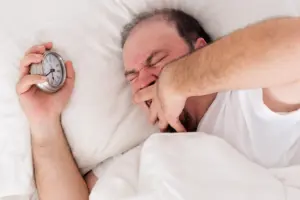
4 Stages of Sleep: We all know sleep is important, but most of us treat it like a single block of downtime: close eyes, wake up, done. The truth? Your brain and body are busy cycling through four distinct stages, each doing its own behind-the-scenes work. Miss one, and you feel it the next day.
From light to REM, here are the four stages of sleep:
Stage 1: The Doorway to Sleep
This is that floaty, half-in, half-out phase. You’re still aware of the room, maybe the hum of a ceiling fan or a dog shifting on the couch, but your body’s starting to power down. Muscles relax. Heart rate slows. It’s short, usually just a few minutes, but it’s the “fragile” stage. Someone drops a spoon in the kitchen? You’re awake again.
Think of it as the warm-up lap before the real race.
Also Read | What causes sleep apnea? How breathing problems disrupt your sleep
Stage 2: The True Disconnect
Stage 2 is where your brain finally decides, “Okay, let’s commit.” Body temperature drops a notch, eye movement stops, and brain activity shows bursts called sleep spindles (they help with memory consolidation, if you’re curious). This is the stage you spend most of the night in, looping back to it after deeper stages. It’s not flashy, but it’s the workhorse. Without it, you’d wake up feeling mentally fuzzy, like you’re operating on dial-up internet.
Stage 3: Deep, Restorative Sleep
Here’s the goldmine. Stage 3, also called slow-wave sleep, is the body’s repair shop. Cells regenerate. The immune system gets a boost. Growth hormone performs its function. You could blast music in the next room, and the person in this stage might not stir. This is the kind of sleep athletes swear by for recovery. Miss it too often, and you’ll notice it in more than just your mood; muscle soreness lingers, and you catch colds more easily.

Stage 4: Rapid Eye Movement (REM) Sleep
Rapid eye movement sleep is where the brain throws on its own midnight movie. Dreams, emotional processing, and creativity bursts, all happen here. Your brain activity actually spikes to near-awake levels, but your body’s essentially paralysed (a clever safety feature so you don’t act out your dreams).
REM isn’t just for vivid dreams; it’s crucial for learning, problem-solving, and emotional balance. Cut your sleep short, like skimping on the last two hours, and you rob yourself of the richest REM chunks. That’s why “just five hours” leaves you emotionally on edge, even if you don’t feel physically tired.
Also Read | Can’t sleep? 10 quick hacks to stop snoring tonight
Sleep isn’t just about quantity; it’s about letting your body cycle through these stages multiple times a night. You don’t control the order, but you can protect the process: keep your room cool and dark, ditch the phone before bed, and give yourself a full 7–9 hours.








